The 25 Best Breakthrough Performances of 2021

There’s no surprise given year when known quantities turn out career-best work in any given year — of course, Penélope Cruz is going to soar as a conflicted mother in the latest Pedro Almodóvar film, Benedict Cumberbatch will kill it as a repressed cattle rancher in a Jane Campion film, and Kate Winslet will nail the rough edges of a Pennsylvania police detective in freefall.
But that also means plenty of fresh faces and new talents get the chance to emerge out of the year’s best films and TV series. A watercooler sensation like “The White Lotus,” featuring a sprawling and diverse cast, meant many audiences were tuning into at least a few key new performers making their breakout bows. Meanwhile, in a year where film festivals were up and running again, a handful of foreign titles gained major crossover traction — meaning that new actors from overseas and beyond are well on their way to becoming arthouse-hold names.
More from IndieWire
Below, IndieWire has combed through another strange pandemic year of stuttered releases and unexpected TV hits to highlight the best breakthrough performances of the year. We expect to hear from, and see plenty more of, these folks in the years ahead.
Christian Blauvelt, Jude Dry, David Ehrlich, and Kate Erbland contributed to this story.
David Ajala, “Star Trek: Discovery”
Until now, “Star Trek” hadn’t had this good of a space romance since Kasidy Yates (Penny Johnson Jerald) and Capt. Sisko (Avery Brooks) way back in the ‘90s on “Deep Space Nine.” But Book (David Ajala) and Capt. Burnham (Sonequa Martin-Green) on “Star Trek: Discovery” have some serious chemistry. A wanderer in the 32nd century, Book was kind of the “Star Trek” answer to Han Solo: a “courier” with a fast ship who defined himself by his piloting skills and by not choosing a side. But unlike Han Solo, he already had a cause, even if he kept it close to the vest: he was secretly rescuing an animal species under threat by interstellar marauders. And he’s a proud cat owner to boot. Ajala brings swagger and heart to Book, who’s the kind of character “Star Trek” needs: someone not in Starfleet, who can show you what it’s really like to live in this distant future. (Not everyone can be in uniform serving the Federation or some other power, right?) It’s not any actor who can step into a 55-year franchise and deliver a truly original character like he did on Season 3 of “Discovery.” Now, in Season 4, he’s the show’s emotional center, as he deals with the loss of his home planet and we journey along with him as he faces his grief. It’s hard now to imagine “Discovery” without him. —CB
Annaleigh Ashford, “Impeachment: American Crime Story” (FX)
Many might know Tony winner Annaleigh Ashford from her work on Broadway in shows like “Kinky Boots” and “Sunday in the Park With George.” Or maybe from her work on Showtime’s series “Masters of Sex.” But this year, Ashford broke out with the one-two punch of the CBS comedy series “B Positive” and her role as the beleaguered Paula Jones in “Impeachment: American Crime Story.” As Paula Jones, Ashford found the humanity within a woman who became a national joke. There’s a sadness to Jones that comes through in Ashford’s forced smiles and downcast eyes. The finale is where Ashford truly shines. A now-divorced Jones lives with her mother and is berated for posing in Penthouse magazine to support her son. As Ashford cries on the phone, attempting to justify her decision, it’s impossible not to feel her frustration — and rage at her position in a misogynistic, tabloid-hungry world. When she finally goes to Los Angeles to pose, we see her fear and disgust at herself for what she’s doing. By the end, people may remember Monica Lewinsky, but Jones is left to buy her groceries as a gas station attendant leers at her. Ashford breaks your heart and leaves you devastated, especially as proof positive of how some women are perceived as more valuable than others. —KL
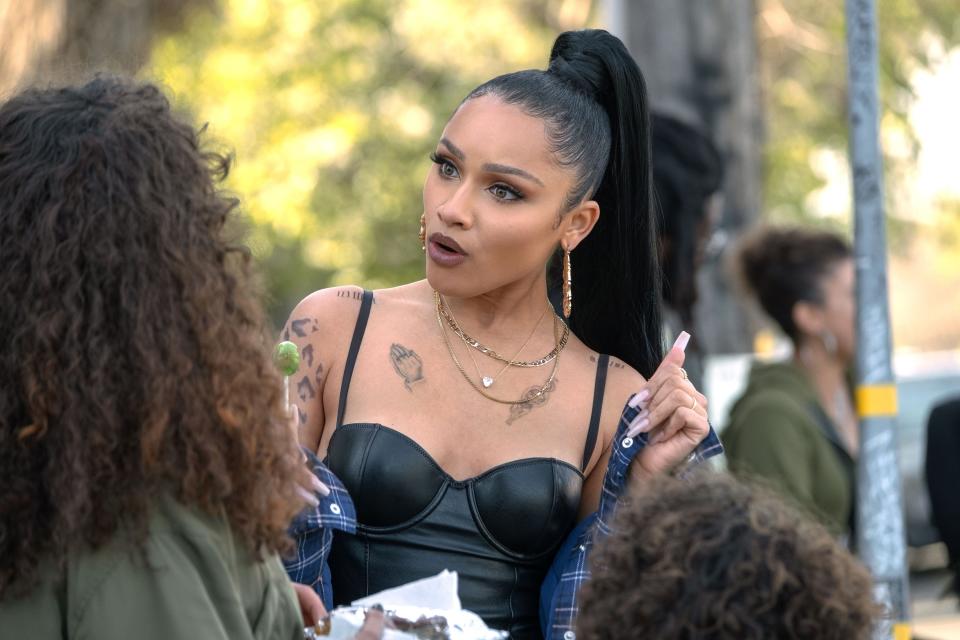
?Starz! Movie Channel/Courtesy Everett Collection
Jaylen Barron, “Blindspotting” (Starz)
“Blindspotting” was a perfect season of television, hands down. Every actor came to play and delivered fantastic performances. Jaylen Barron was one of those performers, playing Miles’ (Rafael Casal) wild sister Trish. Trish could have easily been a female version of Miles, drawing on Casal’s performance in the 2018 feature film version of “Blindspotting.” Instead, Barron made Trish vulnerable, spunky, a pain in the ass, petty, and immature all rolled into one. In Barron’s expertly manicured hands, we see Trish’s sadness at her brother’s incarceration and her need to put on a brave face. Eventually, that facade crumbles and we see Trish figure out what she wants her life to be. Whether attempting to sell her escort business to a banker or getting excited when someone tells her she looks like Doja Cat, Barron was an integral part of why “Blindspotting” was so fantastic in its debut season. —KL
Danny Boyd Jr., “Bruised”
This has been an interesting year for child performers in films. In several instances, they’ve overshadowed the established, A-list stars they’re working opposite, and such is the case with Halle Berry’s directorial debut. Berry’s story as a fighter struggling to get back on top is complicated by the arrival of her estranged son, Manny, beautifully played by the young Boyd Jr. We’ve seen cute kids in complicated family dramas before, but there’s such a deep, haunting quality to his performance here. This is a child still processing so much at a young age, and we see that in every flick of his gaze. During a walk, he catches a snippet of the song “Just the Two of Us” playing on the radio, a song he and his now-deceased father once performed together. The way Boyd’s face just crumbles, unleashing months of grief and sorrow, is heartbreaking. Did I mention he gives us all these emotions without saying a word nearly the entire runtime? —KL
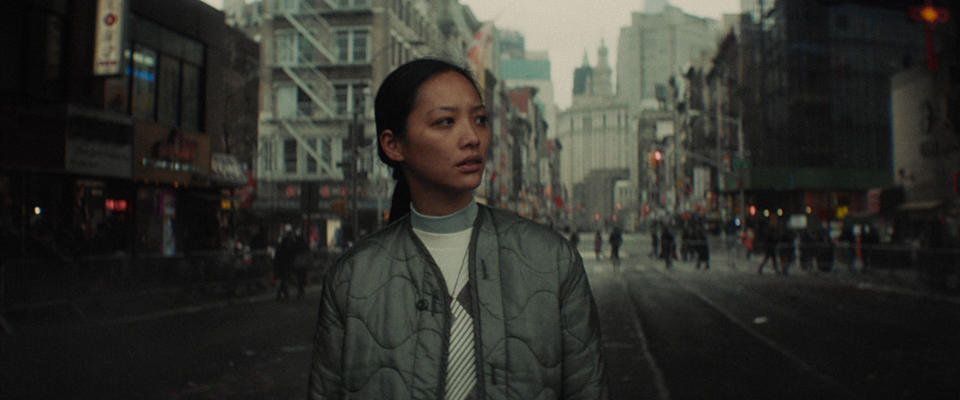
KWPR
Shuya Chang, “Snakehead”
Evan Jackson Leong’s Asian crime drama “Snakehead” remains a feature I’m drawn back to since its premiere this year at TIFF. And much of that is because of Shuya Chang as Sister Tse. Chang’s Sister Tse is a woman focused on survival, but has an action-heroine bent to her that is dazzling to watch. Whether we’re watching her hold a gun or spending time with her estranged daughter, Chang capably handles a wealth of emotions and brings nuance to every scene. Initially, Leong wanted Lucy Liu to star in the film, and it’s impossible to see that after watching Chang’s performance. If Chang wants to become an action star, this is a solid explanation as to why that should happen. —KL
Shannon DeVido, “Best Summer Ever”
Every year I resign myself to seeing absolutely no disabled performers on various end-of-year lists. So to be able to not only have a few choices to select from, and to write a blurb praising someone, is a big deal for me. “Best Summer Ever” is a throwback to musical films of the past, wherein everyone has a song in their heart and just has to express it. The difference is the team at Zeno Mountain Farms told that story with a predominately disabled cast. Shannon DeVido plays Sage, the wheelchair-using free spirit who finds herself drawn to football star Tony (Rickey Alexander Wilson). To see a disabled actress in a movie is one thing, but to see someone like DeVido as a romantic lead is another. Sage is no different from other teen girls; she wants to find love and maybe be less embarrassed by her moms. DeVido is adept at making Sage funny, but more importantly she conveys why she should be anyone’s object of desire! —KL
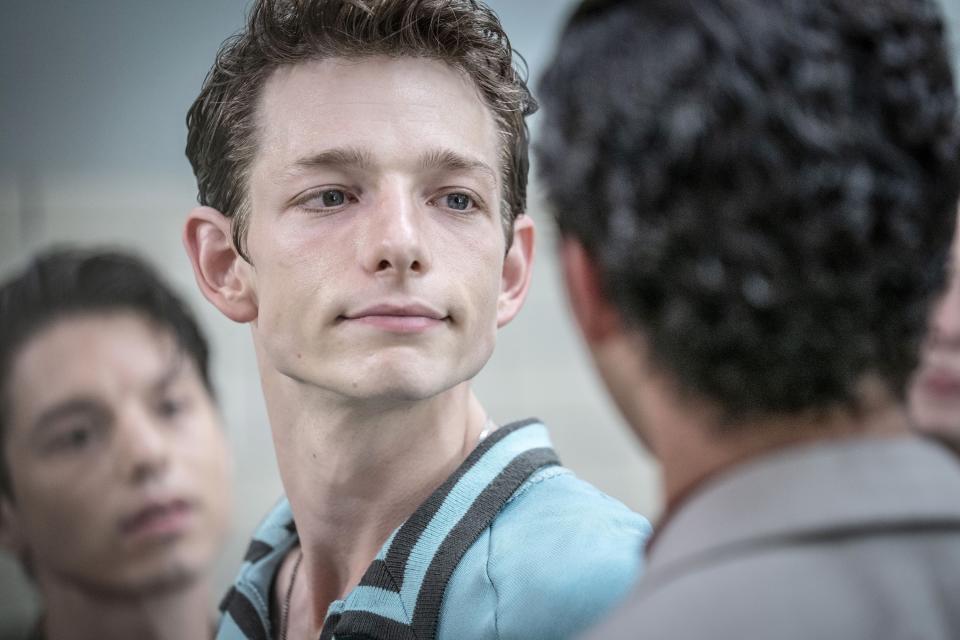
?20th Century Studios/Courtesy Everett Collection
Mike Faist, “West Side Story”
Audiences won’t need to be particularly eagle-eyed to spot the cadre of Broadway stars and standbys who round out the majority of the supporting roles in Steven Spielberg’s dazzling new take on “West Side Story,” but a working knowledge of stage talents is hardly required to recognize the mega-watt Mike Faist as Riff. It’s the kind of “a star is born” role in which you can very nearly see the Tony nominee and Grammy winner morphing into the next big thing before your very eyes, as he breathes new life and pain into the erstwhile leader of the Jets.
Faist’s talents have hardly gone unnoticed in the Broadway space — again, he’s a Tony nominee, thanks to originating the role of Connor in the much-lauded “Dear Evan Hansen” — and he’s appeared in a handful of indie films over the years, but “West Side Story” will likely serve as Faist’s introduction to the wider world. And they better be ready, thanks to a raw-boned, deeply haunted performance as Riff, one that is full of profound emotion and empathy, even as Riff trips his way through horrible mistake after mistake. Faist, however, never trips, bursting off the screen with arguably the film’s best dance moves (and he’s got stiff competition with this group), the kind of incendiary firework of a performance you can’t turn away from. —KE
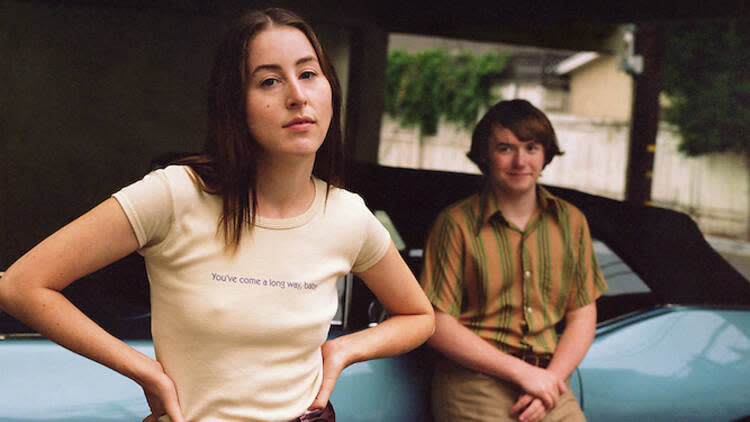
MGM
Alana Haim, “Licorice Pizza”
Paul Thomas Anderson obviously saw something special in Alana Haim, the youngest in the trio of the Haim sisters, and it was enough to build an entire nostalgia-gilded monument to her with “Licorice Pizza.” She plays Alana Kane, a 25-year-old photography assistant in a is-it-or-isn’t-it platonic relationship with 15-year-old Gary, with enough fiery conviction and fluctuating insecurity to fuel a movie on her own. PTA’s love letter to the glory days of the 1970s San Fernando Valley is also a love letter to Haim herself, and you can’t take your eyes off her as she bulldozes her way through mismatched sexual encounters and some of the director’s wildest set pieces ever — including driving a moving truck backward down a hill on an empty tank. This movie is so many things, but primarily the announcement of a major new talent. —RL
Brittany S. Hall, “Test Pattern”
Shatara Michelle Ford’s revelatory first feature is wall-to-wall with “breakout” work, and not just from its remarkably talented filmmaker, but also the two stars that lead this perceptive and often quite painful examination of sexual assault, relationship dynamics, racial divides, and the corrosive power of violence. But while Will Brill always impresses, it’s fitting that “Test Pattern” provides such a showcase for Brittany S. Hall, who lights up a film that’s all about society’s woeful inability to see the people most in need of being recognized.
Weaving back and forth in time, “Test Pattern” opens on the incident that will drive the bulk of the drama’s action: a woozy Renesha (Hall), still somehow managing to sit upright on a bed, a glass of water threatening to tip out of her hand. She’s not alone, and when Mike (Drew Fuller) comes into frame, Renesha’s dulled senses might not instantly realize the threat, but Ford’s invasive lensing of the interaction instantly puts the audience on alert. The discomfort of that scene will stay with both Renesha and the audience, as “Test Pattern” takes us through the events that led to the encounter, and everything that came after.
As Renesha and her boyfriend Evan (Brill) eventually motor around Austin in search of a rape kit (like “Never Rarely Sometimes Always,” “Test Pattern” is a chilling reminder that, for many, female-centric health care is often impossible to obtain), the film makes a sly transition into a drama less about Renesha’s personal trauma, than a wider-ranging look at the absolute dehumanization that seems to accompany bureaucratic matters. Hall, however, holds focus through every twist and turn, locking into every facial expression, every move of her body, every quaver of her voice to fully embody Renesha. It’s a profound performance in a film that serves her well, and it sets the stage for Hall to become one of our best — and, we can only hope, most seen — new dramatic stars. —KE
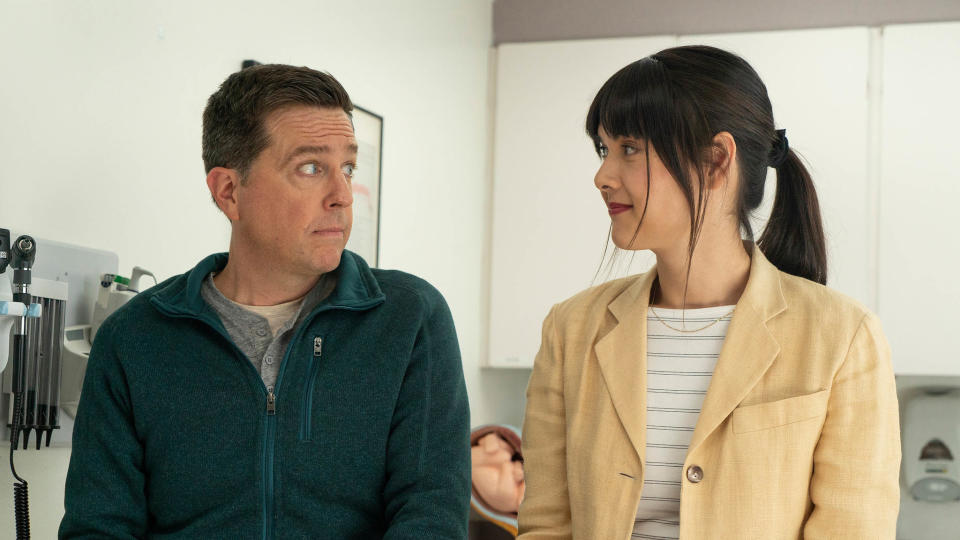
Tiffany Roohani
Patti Harrison, “Together Together”
“Together Together” features an enviable cast of comedy favorites, from big-name faves like Ed Helms and Tig Notaro to the recently crowned prince of weird Julio Torres. But the most exciting performance comes from alt-comedy darling Patti Harrison, who makes an understated splash in her first leading film role. As a recurring presence on TV shows like “Shrill” and “Search Party” and a writer for “Big Mouth,” Harrison’s stand-up is marked by a droll deadpan that borders on antagonistic. That blasé sensibility is rebranded in “Together Together” as a subdued ambivalence that works for the character’s arrested emotional development.
If it’s taken this long to mention that Harrison is trans, it’s because the fact is completely inconsequential to the movie. The obvious next step towards more inclusive casting is trans actors playing cis roles, and there can be no doubt that Harrison is playing a cis character in “Together Together.” The films ends with a birth scene. As Anna breathes and pushes her way through a long and punishing labor, Harrison joins a long line of actresses who have dramatized that particular ritual of womanhood for the screen. It looks about as fun as it does in real life; but it’s also a small miracle. —JD
Fred Hechinger, “The White Lotus” (HBO)
After all was said and done on “The White Lotus,” Fred Hechinger’s Quinn turned out to be the heart and soul of the series, abandoning his self-centered family in the show’s (literal) final moments to canoe off into the Pacific with some native islanders off the shores of a Hawaiian resort for the one-percent. The 21-year-old has had quite the year, appearing in Netflix’s gory “Fear Street” film trilogy and surprising as a psychopathic menace in the same streamer’s tawdry “Woman in the Window.” As tensions ratcheted throughout HBO’s “White Lotus,” it was impossible not to watch Hechinger with eagle eyes as he became increasingly disaffected and indifferent toward his family, camping out on the beach every night to either gloomily masturbate or stare into the abyss. While the “White Lotus” held a funhouse mirror up to all of us with its stuffed cast of affluent, ungrateful, and often grating characters, Quinn offered up a dose of hope for the future — and the possibility of redemption for a social-media generation. —RL
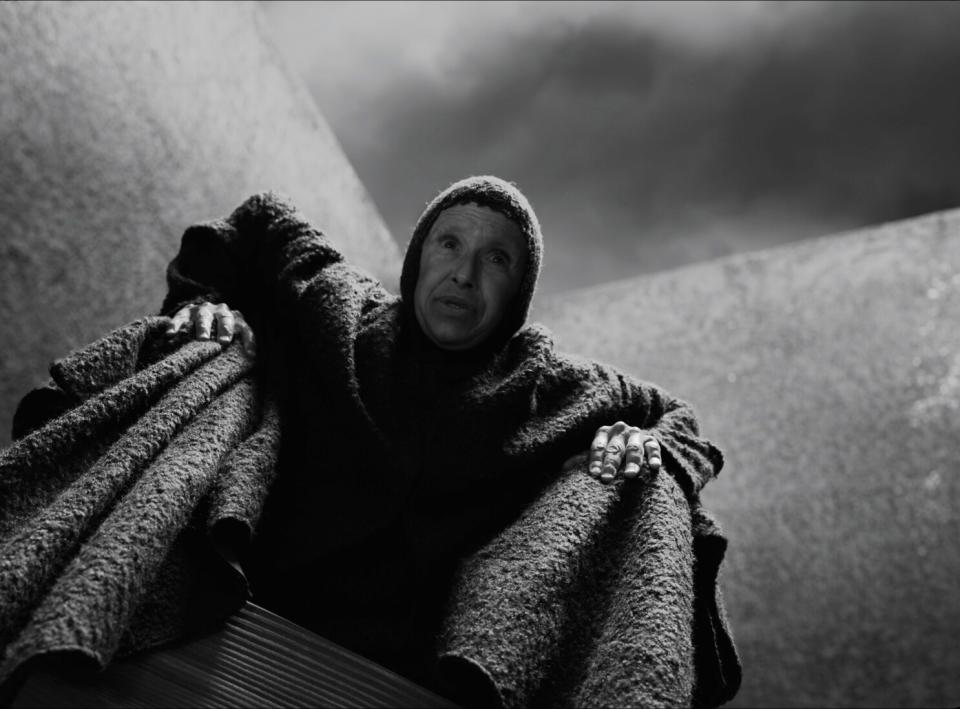
Apple/A24
Kathryn Hunter, “The Tragedy of Macbeth”
It should be hard to pick a standout performer in a Shakespeare adaptation whose cast boasts such an embarrassment of riches — Denzel Washington and Frances McDormand among them — but the MVP reveals herself early and with unforgettable force. Known abroad for her shapeshifting physicality, British actor and theatre director Kathryn Hunter is astounding as the witches — all three of them, in addition to a fourth part later on — who incept Macbeth with the idea that will eventually undo him. A trio of black ravens who collapse into a single human body that walks on bent wings and reveals itself only in the reflection of dirty puddle water, Hunter’s witches capture the same dark magic that Hayao Miyazaki drew into the similarly bird-like Yubaba in “Spirited Away,” and fix the entire movie that follows to the sticking place between life and death. —DE
Devery Jacobs, “Reservation Dogs” (FX)
Let’s be clear, the entire cast of FX’s “Reservation Dogs” could have made this list. They’re all fantastic. But from the minute she’s introduced as Elora Danan, Devery Jacobs dominates the screen. Jacobs is such a strong, nearly intimidating presence as the take-no-prisoners Elora Danan, but with a deep well of warmth that’s tapped into as her character arc is unveiled. One of the more fun parts of the character is how Jacobs plays the sarcastic side of Elora Danan. The opening scene of the pilot, where she scoffs at putting on her seatbelt after stealing a chip truck is one of my favorite line readings of the year. Going to California is a way to take control, but the pull of her friends’ decisions can’t be controlled. —KL
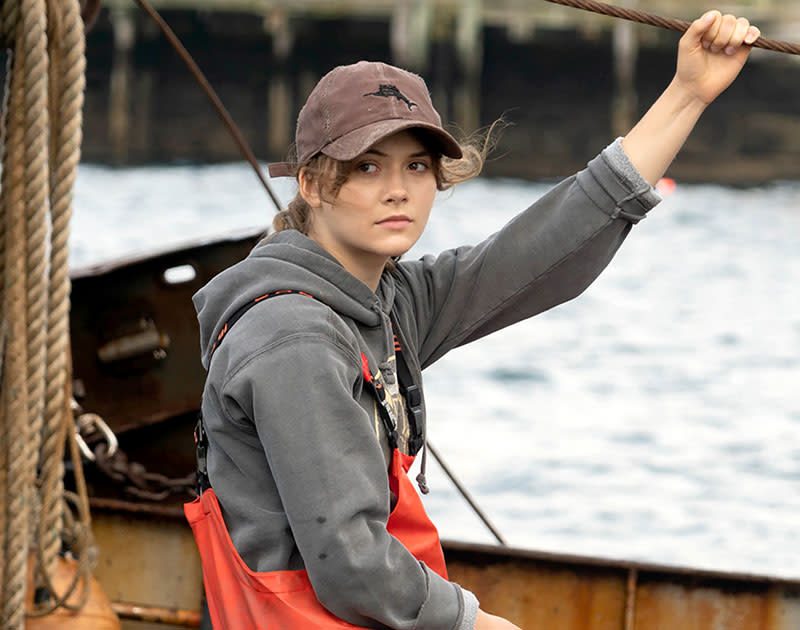
Sundance
Emilia Jones, “Coda”
There’s little surprising about the shape of director Sian Heder’s Sundance smash hit: It’s a family drama and a coming-of-age tale that combines familiar beats about finding yourself, breaking free of your family, and making plenty of mistakes along the way into one tear-jerking package. Yet what “CODA” seemingly lacks in storytelling originality, it more than makes up for with other touches of ingenuity and profound emotional resonance. Much of that can be owed to its sterling cast, including a star-making turn from Emilia Jones as teenage malcontent Ruby Rossi.
“CODA” takes its title from Ruby’s lot in life: she’s the child of deaf adults, played by the vibrant Jackie (Marlee Matlin) and Frank (Troy Kotsur). In fact, Ruby is the only hearing person in her household — her older brother Leo (Daniel Durant) is also deaf; all three of the deaf characters are played by people who are actually deaf, another wonderful feat of casting — and she’s long served as the Rossis’ hearing proxy to the world. But while the Rossis have mostly avoided being a part of the wider world, their fortunes remain entirely tied up in it and, by extension, in Ruby. “CODA” is concerned with what happens when the Rossis’ long-running demands finally hit up against Ruby’s own big dreams, including her burgeoning talent for singing, a pursuit that, quite literally, her family can’t understand.
It’s all predictable, until it isn’t, because Heder and her cast strive for maximum believability and empathy at every turn. And much of that rests on Jones’ more than capable shoulders. Just like Ruby, she’s the one who anchors the family, and Jones — best known to American audiences for her starring role on the series “Locke & Key” — does that with not just ease, but a lived-in charm that’s undeniable in its power and promise for future work to come. —KE
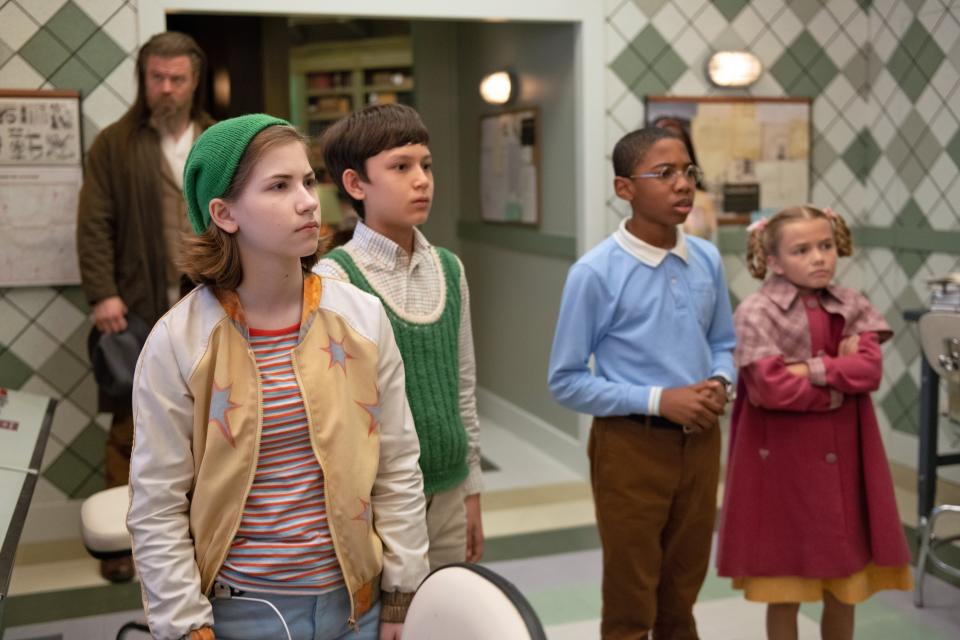
Disney
Marta Kessler, “The Mysterious Benedict Society” (Disney+)
Honestly, I find Marta Kessler as Constance Contraire to be utterly adorable and much of that factored into me putting her on this list. But in revisiting the severely underrated Disney+ series “The Mysterious Benedict Society,” I also got to take notice of Kessler’s comedic timing. It’s crazy to me that at just 12 years old the Russian-born Kessler is an amazingly deadpan comic. Much of the humor of her character isn’t just that she’s mean, constantly mocking her fellow members of the society. She’s also the smartest one in the group, secretly working behind the scenes and making the other characters realize how skilled she is. Kessler has a great command of her facial and vocal intonations to make certain lines just zing, but it also aids in Contraire as a character. She creates a wall between herself and others that slowly crumbles throughout the series. And her hairstyle is utter perfection! —KL
Olivia Liang, “Kung Fu” (The CW)
Christina M. Kim’s reimagining of the 1970s series for The CW is a complete top-to-bottom overhaul, with the title being just about the only thing carrying over. Instead of an Old West setting, the show takes place in present-day San Francisco, among a Chinese-American family carrying a secret. They’re descended from a legendary female warrior of ancient China. And Nicky, a law school student who dropped out to study kung fu at a shaolin monastery, is the specific inheritor of that legacy. It’s a big role, with her “Chosen One” aura and hero’s journey balanced by the fact that she is a very contemporary overachiever, with a little bit of nerdiness thrown in. Imagine the girl in your class who was always first to raise her hand suddenly going on a Joseph Campbell-style quest. That’s a specific tone to pull off, and Olivia Liang has done it magnificently. She’s found a way to be funny and endearing without ever losing the gravitas inherent in her journey. “Kung Fu” soars because it also has a deeply talented ensemble, but its story — which balances individual arcs with an overall mythology, “Lost”-style — wouldn’t work without Liang as the foundation on which to build it. That Liang, a relative newcomer to TV acting, was ready for the challenge is all the more impressive. —CB

Renate Reinsve, “The Worst Person in the World”
For any millennial who ever pratfell in the face of their own indecision-making, “The Worst Person in the World” holds up a grimacing, double-sided mirror that flips between a hard-to-stomach, piercing reality check, and a warm, inviting embrace of relatability for the very same reason. Renate Reinsve gives a full-stop stunning breakout performance (that also won her the Best Actress prize at Cannes) as Julie, a tormented approaching-30-something who waffles between busted professional aspirations and ineffectual lovers, with ultimately no one to come home to at the end of the day but herself. —RL
Marie Reuther, “Kamikaze” (HBO Max)
HBO Max’s melancholy Danish drama series “Kamikaze” is a dour sit, charting the grieving process of an 18-year-old woman trying to understand what her family went through after a fatal plane crash. In the opening episodes, she’s dealt the news swiftly through a farewell text from her father, and from that point, freefalls through the stages of mourning — with the ultimate goal of ending her life by crashing a plane into the desert. Julie is played by newcomer Marie Reuther, a 25-year-old actress who vividly summons what it means to be a teenager (and to be hit with a horrifying blow) in her body and soul. She’s also able to embody Julie’s angry, at-times pathologically lying and restlessly spirit, so that we know she’s just going through the motions of grief even when the actress, of course, never is. —RL
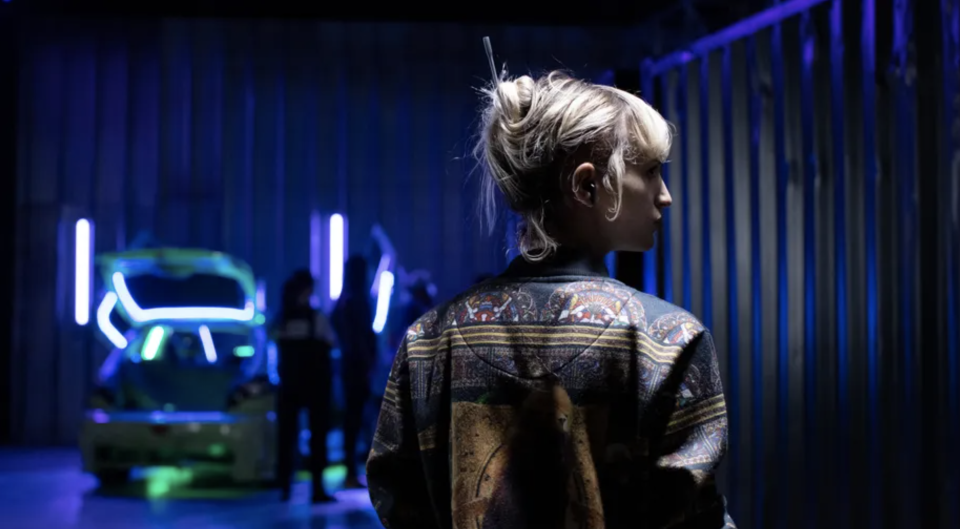
Carole Bethuel
Agathe Rousselle, “Titane”
As Alexia, a terse and severe thirtysomething car model, newcomer Agathe Rousselle gives an unforgettable performance that often evokes a gender-fluid take on the murderous vulnerability Scarlett Johansson brought to “Under the Skin.” She wears her shaggy blonde hair so that the scar from her implant is still extremely visible on the side of her head, as if she wants the world to know about the metal inside her. She writhes around on muscle cars while horny male fans line up for selfies, but the pleasure seems to be all hers. She’s fully in control of her own narrative at the center of Julia Ducournau’s mad vision, surely one of the wildest films ever to win the Cannes Palme d’Or. —DE
Ali Skovbye (“Firefly Lane”)
“Firefly Lane” was far from the best thing I saw this year, but I’ve never forgotten how good the teenage performers are, particularly young Ali Skovbye as Tully (played as an adult by Katherine Heigl). Skovbye certainly gets the more adult elements of the narrative, having to deal with an absentee mother as well as the trauma of sexual assault. Whether it’s her complete command of her wardrobe — Tully was apparently the first person to invent the T-shirt dress — to showcasing the power that comes from having an IDGAF personality, Skovbye sells it. She is the teenage girl every girl wanted to be or be friends with, and that’s a lot to carry on your shoulders as a newcomer to a series. If they wanted to make just a series focused on Skovbye’s young Tully, I’d watch. —KL
Suzanna Son, “Red Rocket”
Director Sean Baker discovered Suzanna Son across the lobby at an Arclight screening of Gus van Sant’s “Don’t Worry, He Won’t Get Far on Foot” in Los Angeles. She gives a heartbreaking performance in an otherwise icky and often aggressively off-putting (by design) movie as Strawberry, the freckled redhead who works behind the counter at the Donut Hole in middle-of-bumfuck Texas. Right on the cusp of her 18th birthday, she’s both shy and na?ve about the ways of the world — and so is easily swept up into what turns out to be a not-so-subtle grooming strategy by ex-porn-star Mikey (played by Simon Rex). Son displays a range of depth, combining vulnerability with a steelier sense of knowing. She might be the only person capable of helping Mikey see what a garbage person he is, even when the audience can’t. —RL
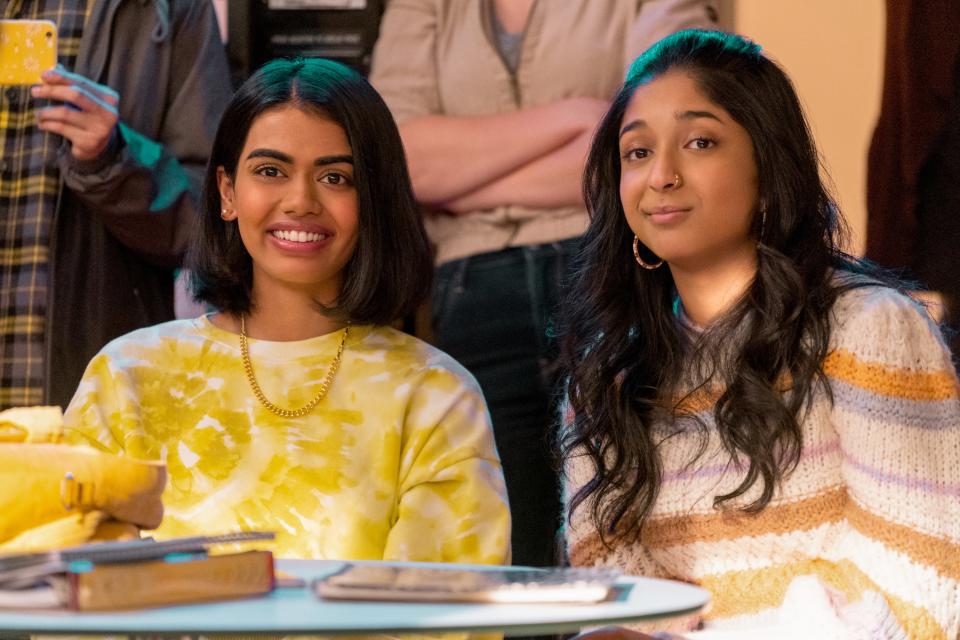
?Netflix/Courtesy Everett Collection
Megan Suri, “Never Have I Ever” (Netflix)
This season’s television did a fantastic job of making us revisit the teenagers we so desperately wish we knew in high school. Similar to “Firefly Lane,” the second season of Netflix’s “Never Have I Ever” marked the arrival of new student Aneesa (Megan Suri), who became the best friend/thorn in the side of the series’ lead Devi (Maitreyi Ramakrishnan). Aneesa is cool, confident, and makes friends easily, leading Devi to question if it’s not just racism that has kept her at a distance from her peers. Suri captures Aneesa’s cool qualities; she’s affable and gregarious. But she also shows the two sides of Aneesa, the one that others see and the one she keeps to herself. When Devi discovers Aneesa has an eating disorder, it brings up questions of the duality of people and Suri illustrates why Aneesa is so desperate to be liked. A truly dynamic performance. —KL
Amalia Ulman, “El Planeta”
The debut feature of Argentine-born Spanish artist-turned-filmmaker Amalia Ulman, Sundance 2021 premiere “El Planeta” is all her: She’s the director, writer, producer, and star, one of only three named characters in the film. (One is her own mother, Ale Ulman, making her acting debut.) Within the sleepy coastal city of Gijón, inside the autonomous region of Spain known as Asturias, they portray mother-daughter grifters María and Leonor, who execute disastrous romantic and financial schemes in the guise of rich people.
Ulman said the film draws from her family’s own financial stress in a post-crisis Spain, but also from the true story of Justina and Ana Belén, penniless mother-daughter con artists who ran up tabs in the thousands that they promised to settle at local businesses but, of course, never could. That means she knows this story from the inside out, and as Leonor, she gives a wonderfully mannered, finely calibrated, and buoyantly comic performance as a millennial adrift in the confusion of bad dates and joblessness. —RL
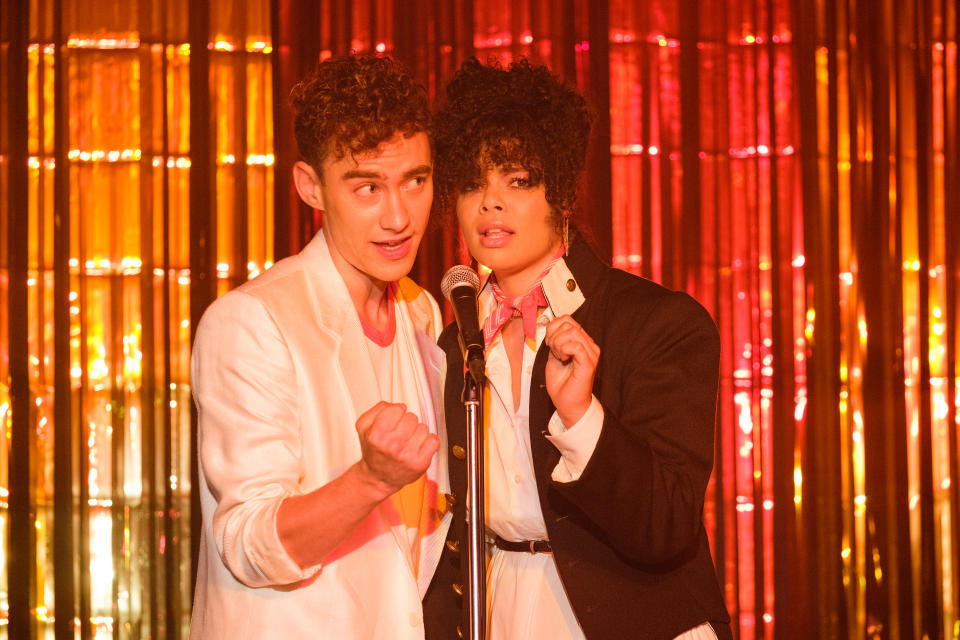
Ross Ferguson
Lydia West, “It’s a Sin” (HBO Max)
Rebellion, joy, sex, and panic define the days and ways of a group of young gay men in 1980s London in Russell T. Davies’ marvelous British miniseries “It’s a Sin.” While the series is ultimately a panorama of how HIV/AIDS affected the gay men of the time, British actress Lydia West walks away with the show as Lydia Baxter. She’s an aspiring thespian who, after first serving as the beard to the “bisexual” Ritchie (Olly Alexander), becomes in many ineffable ways the mother these boys never had, or never could have had. Davies plucked West from his prior (and must-see) BBC One series “Years and Years,” but this series more closely tacks her internal odyssey as Jill begins moving the wary group toward protesting in the streets. West is a constant refreshing presence in a series otherwise about men whose dogmatically apolitical lives unfortunately, inevitably, must become political to survive. —RL
Elisha Williams, “The Wonder Years” (ABC)
It’s gotta be tough starring as the lead in a reboot, especially one like “The Wonder Years.” But Elisha Williams, who stars as the young Dean in the 1965–set story, makes this incarnation stand side by side with its predecessor. Williams has a wonderfully expressive face but, more importantly, Williams is the perfect prism through which to see life. He also has such a command of the material, especially opposite Dulé Hill and Saycon Sengbloh as his parents. The episode discussing pornography is an especially great episode that showcases Williams’ comedic timing. Every look on his face is pure gold. —KL
Best of IndieWire
Recommendation Machine: 'Save Me' Might Be the Best Show You Can Watch on Peacock Right Now
'French Dispatch' and 'Last Night in Soho' Start to Lift Stagnant Specialty Box Office
Every IndieWire TV Review from 2021 So Far, Ranked by Best to Worst Grade
Sign up for Indiewire's Newsletter. For the latest news, follow us on Facebook, Twitter, and Instagram.

